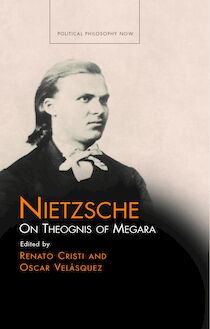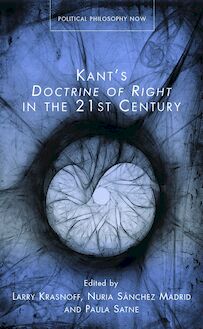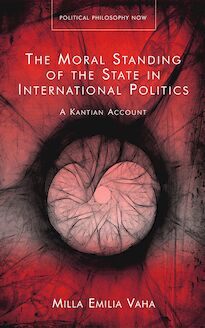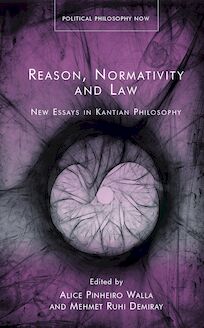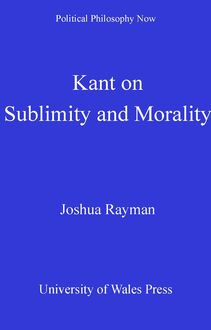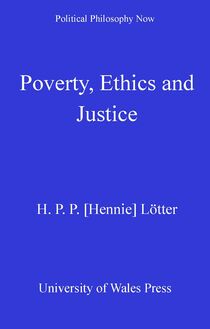Kant and the Theory and Practice of International Right , livre ebook
145
pages
English
Ebooks
2020
Vous pourrez modifier la taille du texte de cet ouvrage
Obtenez un accès à la bibliothèque pour le consulter en ligne En savoir plus
Découvre YouScribe en t'inscrivant gratuitement
Découvre YouScribe en t'inscrivant gratuitement
145
pages
English
Ebooks
2020
Vous pourrez modifier la taille du texte de cet ouvrage
Obtenez un accès à la bibliothèque pour le consulter en ligne En savoir plus
Publié par
Date de parution
01 mars 2020
Nombre de lectures
0
EAN13
9781786835543
Langue
English
This book argues that Kant’s theory of international relations should be interpreted as an attempt to apply the principles of reason to history in general, and in particular to political conditions of the late eighteenth century. It demonstrates how Kant attempts to mediate between a priori theory and practice, and how this works in the field of international law and international relations. Kant appreciates how the precepts of theory have to be tested against the facts, before the theory is enriched to deal with the complexities of their application. In the central chapters of this book, the starting points are apparent contradictions in Kant’s writings; assuming that Kant is a systematic and profound thinker, Cavallar seeks to use these contradictions to discover Kant’s ‘deep structure’, a dynamic and evolutionary theory that tries to anticipate a world where the idea of international justice might be more fully realized.
Preface
Acknowledgements
Introduction: Mediating Between Pure Reason and Practice
The Contemporary Context: Kant’s Judgement on Frederick’s Enlightened Absolutism
Kantian International Right: Background and Paradigm Shift
Judging War
Does Republicanism Promote Peace?
Non-intervention, Humanitarian Intervention and Failed States
Conflicts in Kant’s Account of the Right to Go to War
The Unjust Enemy
Kant’s Society of Nations: Free Federation or World Republic?
Moving Beyond Nationalism: Constitutional
Patriotism and Cosmopolitan Enthusiasm in Kant
Conclusion: A Theory for our Times
Notes
Bibliography
Index
Publié par
Date de parution
01 mars 2020
Nombre de lectures
0
EAN13
9781786835543
Langue
English
POLITICAL PHILOSOPHY NOW
Chief Editor of the Series:
Howard Williams, Aberystwyth University, Wales
Associate Editors:
Wolfgang Kersting, University of Kiel, Germany
Renato Cristi, Wilfrid Laurier University, Waterloo, Canada
Susan Meld Shell, Boston College, Massachusetts, USA
David Boucher, Cardiff University, Wales
Affiliate Editors:
Peter Nicholson, University of York, England
Steven B. Smith, Yale University, USA
Political Philosophy Now is a series which deals with authors, topics and periods in political philosophy from the perspective of their relevance to current debates. The series presents a spread of subjects and points of view from various traditions which include European and New World debates in political philosophy.
Also in series
The Postsecular Political Philosophy of Jürgen Habermas
Dafydd Huw Rees
Kant’s Doctrine of Right in the Twenty-first Century
Edited by Larry Krasnoff, Nuria Sánchez Madrid and Paula Satne
Hegel and Marx: After the Fall of Communism
David MacGregor
Politics and Teleology in Kant
Edited by Paul Formosa, Avery Goldman and Tatiana Patrone
Identity, Politics and the Novel: The Aesthetic Moment
Ian Fraser
Kant on Sublimity and Morality
Joshua Rayman
Politics and Metaphysics in Kant
Edited by Sorin Baiasu, Sami Pihlstrom and Howard Williams
Nietzsche and Napoleon: The Dionysian Conspiracy
Don Dombowsky
Nietzsche On Theognis of Megara
Renato Cristi and Oscar Velásquez
Francis Fukuyama and the end of history
Howard Williams, David Sullivan and E. Gwynn Matthews
Kant’s Political Legacy: Human Rights, Peace, Progress
Luigi Caranti
POLITICAL PHILOSOPHY NOW
Kant and the Theory and Practice of International Right
Georg Cavallar
Second, revised and enlarged edition
© Georg Cavallar, 2020
All rights reserved. No part of this book may be reproduced in any material form (including photocopying or storing it in any medium by electronic means and whether or not transiently or incidentally to some other use of this publication) without the written permission of the copyright owner except in accordance with the provisions of the Copyright, Designs and Patents Act 1988. Applications for the copyright owner’s written permission to reproduce any part of this publication should be addressed to the University of Wales Press, University Registry, King Edward VII Avenue, Cardiff CF10 3NS.
www.uwp.co.uk
British Library Cataloguing-in-Publication Data
A catalogue record for this book is available from the British Library.
ISBN 978-1-78683-552-9
e-ISBN 978-1-78683-554-3
The right of Georg Cavallar to be identified as author of this work have been asserted in accordance with sections 77, 78 and 79 of the Copyright, Designs and Patents Act 1988.
The publisher has no responsibility for the persistence or accuracy of URLs for any external or third-party internet websites referred to in this book, and does not guarantee that any content on such websites is, or will remain, accurate or appropriate.
Cover image: Immanuel Kant, 19th century steel engraving. The Granger Collection/Alamy
Contents
Preface
Acknowledgements
Introduction: Mediating Between Pure Reason and Practice
1 The Contemporary Context: Kant’s Judgement on Frederick’s Enlightened Absolutism
2 Kantian International Right: Background and Paradigm Shift
3 Judging War
4 Does Republicanism Promote Peace?
5 Non-intervention, Humanitarian Intervention and Failed States
6 Conflicts in Kant’s Account of the Right to Go to War
7 The Unjust Enemy
8 Kant’s Society of Nations: Free Federation or World Republic?
9 Moving Beyond Nationalism: Constitutional Patriotism and Cosmopolitan Enthusiasm in Kant’s Philosophy
Conclusion: A Theory for our Times
Notes
Bibliography
Preface
The first edition of this book was published in 1999, when I lived in the United States for the second time. It grew out of a protracted preoccupation with what might be called ‘Kant’s international relations thinking’. I am indebted to Sharon Anderson-Gold, Herta Nagl-Docekal, Volker Gerhardt, John Christian Laursen, Gerhard Luf, Hans-Dieter Klein, Ingeborg Maus, August Reinisch, Alexander Somek, Howard Williams and many others who have helped me to come to terms with Kant’s complex philosophy. Back then, work on this book was made possible by two generous scholarships financed by the Fonds zur Förderung der wissenschaftlichen Forschung , Vienna. I finished this book when I was visiting scholar at the Department of Political Science, University of California, Riverside. After having received all this assistance, anything I have still managed to get wrong is my sole responsibility. I want to thank Sarah Lewis at UWP, and again Howard Williams for helping me to get this second edition published. The book is dedicated to my wife Angelika and our three thriving children, who still cannot understand why on earth people write books and do not get a lot of money for them.
All references to Kant’s works are in accordance with the Akademie-Edition , vol. 1–29 of Kant’s Gesammelte Schriften , Berlin/Leipzig, 1902–. This edition is referred to by Roman (volume) and Arabic (subvolume, pages and lines) numbers. Thus, XXVII, 2, 1, 673, 38–674, 2 refers to volume 27, subvolume 2, 1, page 673, line 38 to page 674, line 2. The English translations are from Hans Reiss (ed.), Kant, Political Writings (Cambridge: Cambridge University Press, 1991). For the parts not covered by Reiss’s edition, I use the Cambridge Edition of the Works of Immanuel Kant (New York: Cambridge University Press, 1992–). References to the Critique of Pure Reason follow the customary pagination of the first (A) and second (B) edition.
Vienna and St Gilgen Summer 2019
Acknowledgements
Acknowledgement is due for the following: A different version of ‘Kant’s Judgement on Frederick’s enlightened absolutism’ was first published in History of Political Thought , 14 (1993), 103–32. chapter 3 was first published in German as ‘Kants Urteilen über den Krieg’, in Hoke Robinson (ed.), Proceedings of the Eighth International Kant Congress, Memphis 1995 (Milwaukee, Marquette University Press, 1995), vol. 2/1, 81–90. Parts of chapter 4 are taken from Theories of Dynamic Cosmopolitanism in Modern European History (Oxford: Peter Lang, 2017), pp. 116–24 and pp. 137–48. Parts of that text were first printed in ‘Kantian Perspectives on Democratic Peace: Alternatives to Doyle’, Review of International Studies , 27 (2001), 229–48; reprint: Arthur Ripstein (ed.), Immanuel Kant (Hants: Ashgate, 2008), pp. 535–54. ‘Kant, intervention, and the “failed state”’ appeared in Kantian Review , 2 (December 1998), 99–106. ‘Conflicts in Kant’s account of the right to go to war’ was first published in The European Legacy: Toward New Paradigms , 2 (1997), 991–9, and ‘Kant’s society of nations: free federation or world republic?’ in Journal of the History of Philosophy , 32 (1994), 461–82. The section ‘On the use and abuse of Kant in international relations theory: a critique of Susan Meld Shell’ at the end of chapter 7 was originally published as ‘Commentary on Susan Meld Shell, “Kant on Just War and ‘Unjust Enemies’”: Reflections on a ‘Pleonasm’“, Kantian Review , 11 (2006), 117–24. Chapter 9 was published under the title ‘Jürgen Habermas and Manfred Riedel: Moving beyond Nationalism’, in Howard Williams, Colin Wight, and Norbert Kapferer (eds), Political Thought and German Reunification (Houndmills: Macmillan Press, 2000), pp. 177–93. I am grateful to all publishers for their generous permission to reprint the texts.
Introduction: Mediating Between Pure Reason and Practice
Virtue itself turns vice being misapplied. Shakespeare, Romeo and Juliet
This book argues that Kant’s so-called theory of international relations can and should be read as Kant’s attempt to apply the a priori principles of reason to a particular, historical situation, especially to the political conditions of the late eighteenth century. Conservative philosophers like Friedrich von Gentz (1764–1832) and August Wilhelm Rehberg (1757–1836) had criticized Kantian political philosophy for its alleged idealism and impracticability in the 1790s. Gentz turned away from Kant after he had translated Burke’s Reflections on the Revolution in France into German. He thought that Kant’s a priori doctrine of human rights was just preliminary work. If anyone wanted to realize this theory, the means to do so had to be studied as well. A ‘new theory based on experience’ should study human beings, their passions and talents, social conditions and history in order to find out which constitution was the best for a certain people. For Gentz, Kant’s theory was insufficient and incomplete. 1 Rehberg thought that Kant’s doctrine could not be applied in reality as it presupposed morally and rationally perfect beings. The categorical imperative was so formal that it could not specify the content of particular duties. Kant’s principles were too generic and too idealistic to be applied in the real world. 2
Kant was familiar with this explicit criticism of his theory, and developed his political philosophy in his later writings as a link between the pure doctrine of right and the real world. According to Kant, experience is systematically subordinated to the ‘precepts of theory’. However, experience has an important function as it helps us to learn how ‘theory could be better and more generally put to work, after one has adopted it into one’s principles’ (VIII, 289, 1–4). Some interpreters have become aware of this major aspect in Kant’s thinking, among them Wolfgang Kersting, Reinhard Brandt, Ingeborg Maus, Volker Gerhardt, Arthur Ripstein, Reidar Maliks, Francis Cheneval, Elisabeth Ellis, Pauline Kleingeld, Howard Williams, Sharon Byrd and Joachim Hruschka. 3 Back in 1962, Jürgen Habermas argued that Kant’s principle of publicity is an attempt to link the intelligible with the empirical. ‘[R]eason in its historical process

